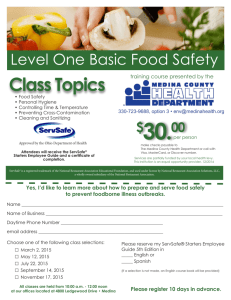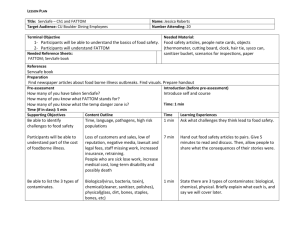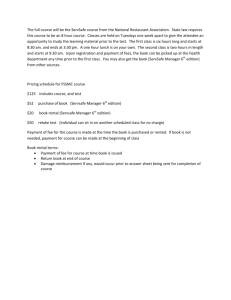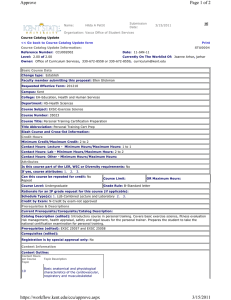of Submission Name:
advertisement
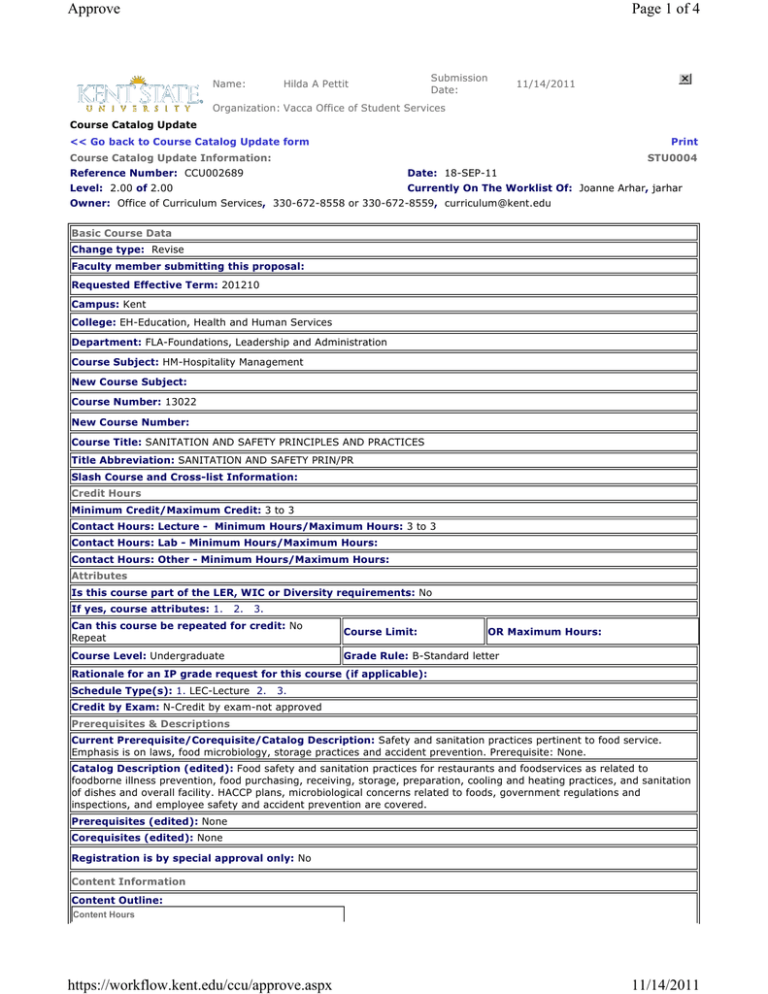
Approve Page 1 of 4 Name: Submission Date: Hilda A Pettit 11/14/2011 Organization: Vacca Office of Student Services Course Catalog Update << Go back to Course Catalog Update form Print Course Catalog Update Information: STU0004 Reference Number: CCU002689 Date: 18-SEP-11 Level: 2.00 of 2.00 Currently On The Worklist Of: Joanne Arhar, jarhar Owner: Office of Curriculum Services, 330-672-8558 or 330-672-8559, curriculum@kent.edu Basic Course Data Change type: Revise Faculty member submitting this proposal: Requested Effective Term: 201210 Campus: Kent College: EH-Education, Health and Human Services Department: FLA-Foundations, Leadership and Administration Course Subject: HM-Hospitality Management New Course Subject: Course Number: 13022 New Course Number: Course Title: SANITATION AND SAFETY PRINCIPLES AND PRACTICES Title Abbreviation: SANITATION AND SAFETY PRIN/PR Slash Course and Cross-list Information: Credit Hours Minimum Credit/Maximum Credit: 3 to 3 Contact Hours: Lecture - Minimum Hours/Maximum Hours: 3 to 3 Contact Hours: Lab - Minimum Hours/Maximum Hours: Contact Hours: Other - Minimum Hours/Maximum Hours: Attributes Is this course part of the LER, WIC or Diversity requirements: No If yes, course attributes: 1. 2. 3. Can this course be repeated for credit: No Repeat Course Limit: Course Level: Undergraduate Grade Rule: B-Standard letter OR Maximum Hours: Rationale for an IP grade request for this course (if applicable): Schedule Type(s): 1. LEC-Lecture 2. 3. Credit by Exam: N-Credit by exam-not approved Prerequisites & Descriptions Current Prerequisite/Corequisite/Catalog Description: Safety and sanitation practices pertinent to food service. Emphasis is on laws, food microbiology, storage practices and accident prevention. Prerequisite: None. Catalog Description (edited): Food safety and sanitation practices for restaurants and foodservices as related to foodborne illness prevention, food purchasing, receiving, storage, preparation, cooling and heating practices, and sanitation of dishes and overall facility. HACCP plans, microbiological concerns related to foods, government regulations and inspections, and employee safety and accident prevention are covered. Prerequisites (edited): None Corequisites (edited): None Registration is by special approval only: No Content Information Content Outline: Content Hours https://workflow.kent.edu/ccu/approve.aspx 11/14/2011 Approve per Course Topic 3 3 3 3 3 3 3 3 3 3 3 3 3 6 Page 2 of 4 Topic Description Providing safe food. Introduction to issues of safe food in the foodservice businesses. Microbiology concepts as related to food safety. Bacteria growth, water activity, time and temperature relationships. Microorganisms responsible for foodborne illness. Food contamination, food allergens, and foodborne illnesses. Prevention and control of microbiological, chemical, and physical hazards. Safe food handlers. Health and personal hygiene issues. Handwashing and cross contamination issues. Training and supervision for food safety. HACCP - Hazard Analysis Critical Control Points. Understanding the flow of food through a foodservice organization in relation to food safety. HACCP in relation to purchasing, receiving, storage. Government regulations and inspections as related to wholesome food. Control of food and chemical storage. Time and temperature control. HACCP and food preparation. Time and temperature control. Safe endpoint cooking temperatures and reheating temperatures. Temperature danger zone. Avoidance of cross contamination. Control of critical control points. HACCP and Service. Control of food safety during service of food to include temperatures and cross contamination. Developing a HACCP system. Managing the entire foodservice operation to assure safe food and avoid foodborne illness. Crisis management in event of a foodborne outbreak. Sanitary facilities and equipment. NSF equipment. Cleaning supplies and practices. Cleaning and sanitizing. Methods to sanitize including heat and chemicals appropriate for use in a food service. Understanding of PPM and importance of monitoring sanitizing chemicals or temperature guidelines for heat sanitizing dish machines. Integrated pest management. Types of pests that may be a concern in the foodservice. Methods of prevention and control. Implications for food safety. Food safety regulations and standards. Health inspections and other regulatory requirements affecting foodservice operators who prepare and serve foods on site or off site. Employee food safety training and supervision. Oversight and management of food handlers. Fire https://workflow.kent.edu/ccu/approve.aspx 11/14/2011 Approve Page 3 of 4 safety. Prevention of accidents. CPR and first aid. Display/Hide Delimited Course Outline Total Contact Hours: 45 Textbook(s) used in this course: National Restaurant Association. ServSafe Course Book. Writing Expectations: Short papers and assignments are included in the course. Instructor(s) expected to teach: Mandy Ulicney, Ed Hoegler, or other Instructor(s) contributing to content: Barbara Scheule and Ed Hoegler Proposal Summary Explain the purpose for this proposal: The purpose for the proposal is to update the course decription, course content, and to enable students who have a current National Restaurant Association ServSafe Certificate to test out of this class. Students who take this course take the ServSafe exam and are expected to earn a passing score and therefore become ServSafe Certified. Explain how this proposal affects program requirements and students in your unit: Students who are already National Restaurant ServSafe Certified and provide proof of a current certificate will have the opportunity to test out of this course by showing a knowledge of the ServSafe content as well as the additional content within the course. Explain how this proposal affects courses, program requirements and student in other units: No impact anticipated. Course is required for Hospitality Management students. Explain how this proposal affects enrollment and staffing: No impact anticipated. Units consulted (other departments, programs or campuses affected by the proposal): Kent State Ashtabula campus also offers this course and was informed of the option for students to test out of the course if the student had a current National Restaurant Association ServSafe Certificate, and the relatively minor modifications to the course description and course content. Revisions made to form (if applicable): Course Content Number Credit by Exam Prerequisites Credit Hours Schedule Type Cross--Listed / Slash Cross Subject Description Title Diversity Title Abbreviation Grade Rule Writing--Intensive (WIC) Writing Liberal Education Requirement (LER) Other Comments (500 Character Maximum): NOTE: Please do not use the following restricted characters: (~ * / \ --) Approve Comments: Date 11/9/2011 Return To Initiator User Barbara M. E Scheule Return To Prior Approver Deny Comment No comments available. History: https://workflow.kent.edu/ccu/approve.aspx 11/14/2011 Approve Page 4 of 4 Date User Status 11/10/2011 Shawn M Fitzgerald Approved 11/9/2011 Barbara M. E Scheule Submitted https://workflow.kent.edu/ccu/approve.aspx 11/14/2011
